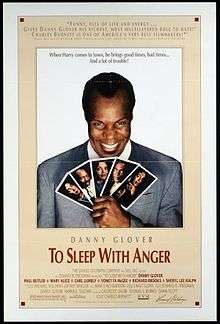To Sleep with Anger
| To Sleep with Anger | |
|---|---|
 Film poster | |
| Directed by | Charles Burnett |
| Produced by |
Thomas S. Byrnes Caldecot Chubb Darin Scott |
| Written by | Charles Burnett |
| Starring | |
| Music by | Stephen James Taylor |
| Cinematography | Walt Lloyd |
| Edited by | Nancy Richardson |
| Distributed by | The Samuel Goldwyn Company |
Release date |
|
Running time | 102 minutes |
| Country | United States |
| Language | English |
To Sleep with Anger is a 1990 American drama film directed and written by Charles Burnett.
Plot
Harry (Danny Glover), an enigmatic old friend from the South, comes to visit Gideon (Paul Butler) and his wife Suzie (Mary Alice), who haven't seen him for many years, who are delighted to see him again, and who insist that he stay with them for as long as he would like. Gideon and Suzie live in South Central Los Angeles, though they retain some of their rural southern ways, including raising chickens in the backyard. Harry has a charming, down-home manner, but his presence brings to a crisis the simmering trouble that is already in the family—especially as regards the younger son, Samuel or "Baby Brother" (Richard Brooks), and his relation to his parents, wife, and older brother, Junior (Carl Lumbly). His disruptive presence is dangerous (his influence threatens to break up Samuel's marriage and seems to be related to the illness that puts Gideon in bed in serious condition for a couple weeks), but ultimately purgative: Gideon's extended family is much more cohesive as a result of Harry's visit. The storm accompanying the wound Suzie suffers when she grasps the knife that Samuel and Junior are struggling over during their climactic fight clears while the two brothers quietly reconcile (during a long wait in an emergency room) and, similarly, the simmering anger that Harry seemed to bring to a boil is also dissipated. Harry's death just before the end of the film suggests, ambiguously, that he has been to a degree a self-sacrificing savior of the family.
Cast
- Danny Glover as Harry
- Paul Butler as Gideon
- DeVaughn Nixon as Sunny
- Mary Alice as Suzie
- Reina King as Rhonda
- Cory Curtis as Skip
- Richard Brooks as Babe Brother
- Sheryl Lee Ralph as Linda
- Carl Lumbly as Junior
- Paula Bellamy as Mrs. Baker
- Vonetta McGee as Pat
- Wonderful Smith as Preacher
- Ethel Ayler as Hattie
- Beverly Mickins as Neighbor
- Jimmy Witherspoon as Percy
Awards
The film won four Independent Spirit Awards, including Best Director and Best Screenplay for Charles Burnett, Best Male Lead for Danny Glover, and Best Supporting Female for Sheryl Lee Ralph.
Burnett also won the National Society of Film Critics Award for Best Screenplay and the Special Jury Prize at the Sundance Film Festival.
Critics
Roger Ebert called it "too long" in a negative review (2.5/4).[1] Christopher Null called it "insanely over-rated" and gave it 2/5 stars ("weak").[2] Entertainment Weekly's Owen Glieberman called it "too ambitious" and said it "never finds a mood" [3]
External links
References
- ↑ To Sleep With Anger Moview Review (1990) http://www.rogerebert.com/reviews/to-sleep-with-anger-1990
- ↑ To Sleep With Anger Review http://www.contactmusic.net/film/review/tosleepwithanger
- ↑ http://ew.com/article/1990/11/09/sleep-anger/